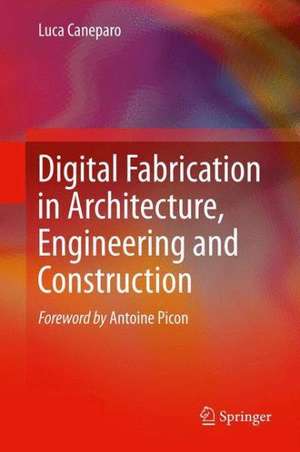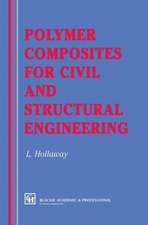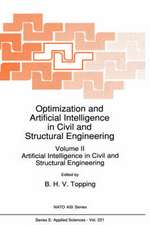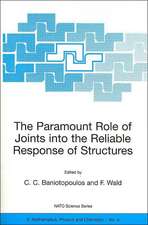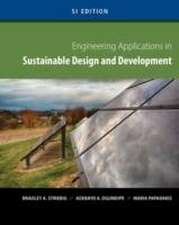Digital Fabrication in Architecture, Engineering and Construction
Autor Luca Caneparoen Limba Engleză Hardback – 15 oct 2013
The evolution of the culture of design and construction is the underlying theme of this book. The aim is to discuss the direction that innovation is now taking, with a particular focus on today’s cutting-edge architectures. The method addresses the ways in which different societies have dealt with the issues of their age regarding design and construction, the different contributions provided by various techniques, and with them the meanings expressed by the architecture.
As building design using digital tools requires specific skills in the fabrication processes and in the languages used by information technology, the book also offers a practical guide to new methods and techniques of managing and controlling fabrication for AEC. A systematic analysis of new skills used in the design process presents an overview of opportunities for architects and engineers.
By collecting information on significant projects and analyzing them, the book explores the technical and artistic potential of digital technology. The cases studied are the outcomes of groundbreaking projects which were able to give form and significance to technological research. They show that digital tools are not the exclusive prerogative of large firms but can also beadopted by teams working across small and medium-sized firms – firms which have been able to use informed research to link innovative design with the possibilities offered by digital fabrication in architecture.
| Toate formatele și edițiile | Preț | Express |
|---|---|---|
| Paperback (1) | 540.80 lei 38-44 zile | |
| SPRINGER NETHERLANDS – 27 aug 2016 | 540.80 lei 38-44 zile | |
| Hardback (1) | 896.21 lei 6-8 săpt. | |
| SPRINGER NETHERLANDS – 15 oct 2013 | 896.21 lei 6-8 săpt. |
Preț: 896.21 lei
Preț vechi: 1092.93 lei
-18% Nou
Puncte Express: 1344
Preț estimativ în valută:
171.49€ • 179.53$ • 141.90£
171.49€ • 179.53$ • 141.90£
Carte tipărită la comandă
Livrare economică 05-19 aprilie
Preluare comenzi: 021 569.72.76
Specificații
ISBN-13: 9789400771369
ISBN-10: 9400771363
Pagini: 210
Ilustrații: XIII, 218 p. 165 illus., 124 illus. in color.
Dimensiuni: 155 x 235 x 20 mm
Greutate: 0.59 kg
Ediția:2014
Editura: SPRINGER NETHERLANDS
Colecția Springer
Locul publicării:Dordrecht, Netherlands
ISBN-10: 9400771363
Pagini: 210
Ilustrații: XIII, 218 p. 165 illus., 124 illus. in color.
Dimensiuni: 155 x 235 x 20 mm
Greutate: 0.59 kg
Ediția:2014
Editura: SPRINGER NETHERLANDS
Colecția Springer
Locul publicării:Dordrecht, Netherlands
Public țintă
ResearchCuprins
1 Origins of industrial production and prefabrication.- 2 Digital production.- 3 Design for manufacture.- 4 Digital manufacture of metals.- 5 Digital woodworking.
Recenzii
From the reviews:
“The new book Digital Fabrication in Architecture, Engineering and Construction by Luca Caneparo is a much needed book to spread the light of knowledge on digital design and its impact on the construction industry. … The whole book is a detailed description of the digitalization process and introduces readers to the technical terms and describes it briefly. This immaculately referenced and deftly researched book should take place in bookshelf of every academician, library and teachers of this field.” (Book Review (Jadavpur University), January-March, 2014)
“The new book Digital Fabrication in Architecture, Engineering and Construction by Luca Caneparo is a much needed book to spread the light of knowledge on digital design and its impact on the construction industry. … The whole book is a detailed description of the digitalization process and introduces readers to the technical terms and describes it briefly. This immaculately referenced and deftly researched book should take place in bookshelf of every academician, library and teachers of this field.” (Book Review (Jadavpur University), January-March, 2014)
Textul de pe ultima copertă
Digital technologies are changing the relationship between design and construction: with computer models, CAD/CAM, and prototyping, designers can gain direct control of building and construction processes. The ability to digitally model designs, and thus to use those models directly in the context of production, creates a synthesis between design and construction in keeping with the tradition of the close relationship between design and craftsmanship, between the quality of the design and the rules of the craft.
The evolution of the culture of design and construction is the underlying theme of this book. The aim is to discuss the direction that innovation is now taking, with a particular focus on today’s cutting-edge architectures. The method addresses the ways in which different societies have dealt with the issues of their age regarding design and construction, the different contributions provided by various techniques, and with them the meanings expressed by the architecture.
As building design using digital tools requires specific skills in the fabrication processes and in the languages used by information technology, the book also offers a practical guide to new methods and techniques of managing and controlling fabrication for AEC. A systematic analysis of new skills used in the design process presents an overview of opportunities for architects and engineers.
By collecting information on significant projects and analyzing them, the book explores the technical and artistic potential of digital technology. The cases studied are the outcomes of groundbreaking projects which were able to give form and significance to technological research. They show that digital tools are not the exclusive prerogative of large firms but can also beadopted by teams working across small and medium-sized firms – firms which have been able to use informed research to link innovative design with the possibilities offered by digital fabrication in architecture.
The evolution of the culture of design and construction is the underlying theme of this book. The aim is to discuss the direction that innovation is now taking, with a particular focus on today’s cutting-edge architectures. The method addresses the ways in which different societies have dealt with the issues of their age regarding design and construction, the different contributions provided by various techniques, and with them the meanings expressed by the architecture.
As building design using digital tools requires specific skills in the fabrication processes and in the languages used by information technology, the book also offers a practical guide to new methods and techniques of managing and controlling fabrication for AEC. A systematic analysis of new skills used in the design process presents an overview of opportunities for architects and engineers.
By collecting information on significant projects and analyzing them, the book explores the technical and artistic potential of digital technology. The cases studied are the outcomes of groundbreaking projects which were able to give form and significance to technological research. They show that digital tools are not the exclusive prerogative of large firms but can also beadopted by teams working across small and medium-sized firms – firms which have been able to use informed research to link innovative design with the possibilities offered by digital fabrication in architecture.
Caracteristici
Presents innovative and promising digital construction technologies in engineering and architecture Of interest to professionals and practitioners Serves as a daily reference tool for anyone involved in design and construction processes Suitable as a reference for design and construction courses
